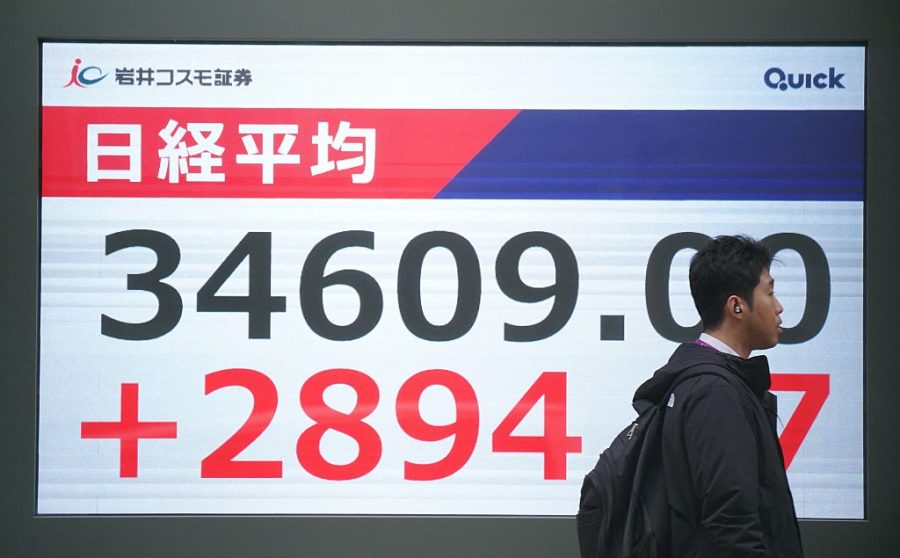Asian markets are rebounding after President Trump announced a 90-day ‘pause’ in the implementation of the ‘Liberation Day’ tariffs that had sent shock waves through the financial community. Most dizzying perhaps were events in Japan, where after a vertiginous plunge on Monday, the Nikkei surged over 8.5 per cent on this morning’s trading. Japan’s iconic companies had a good day: Toyota was up 6 per cent, Sony 12 per cent and Mitsubishi 10 per cent. Elsewhere in Asia, the South Korean KOSPI rose 6 per cent, the Hang Sang climbed 2.69 per cent, the Singapore Composite Index 1.29 per cent and Taiwan’s stock exchange was up over 9 per cent.
It is worth noting, amidst the audible sighs of relief, that the suspension applies only to the ‘reciprocal tariffs’ (in Japan’s case 24 per cent, in South Korea 25 per cent) and that the 10 per cent base line which came into effect on Saturday remains. The new auto parts tariffs are still set to be implemented on 3 May, though Tokyo in particular is pushing for a rethink on those, and the global car tariffs too.
Trump does seem to have been impressed by Japan’s willingness to engage and compromise
Coming out of all of this rather well is Japanese Prime Minister Shigeru Ishiba. The last week has been a masterclass in Japanese tact and strategic understatement. The initial announcement of the tariffs was described as ‘regrettable’ and ‘hard to understand’ by Ishiba, while last night’s dramatic reprieve was met with an almost comically mild response. ‘We take the recent announcement by the US government in a positive light,’ said chief cabinet secretary Yoshimasa Hayashi.
There were pledges of a ‘rational’ response and a complete avoidance of intemperate or potentially aggravating language and no talk of retaliation – though it was never clear how that could have worked anyway. Ishiba moved quickly and apparently urged Trump to rethink his tariff policy in a reportedly ‘polite’ phone call on Monday.
Did it have any effect? Trump does seem to have been impressed by Japan’s willingness to engage and compromise and purred as he referenced the ‘top team’ Ishiba was despatching to Washington for trade negotiations. He may at least have been grateful to Japan for offering a response (which included the proposition of a wide-ranging recalibration of the US-Japan business and security relationship) which could be cited as an example for others to follow.
However, far more likely than Trump being influenced by Ishiba’s urgings, is that the US president has reacted to the panic in the American domestic economy and the surge in bond yields. The White House has sent out mixed messages, with Trump himself at one point admitting the pause was a reaction to ‘people getting a little bit afraid’. This was an explanation later contradicted by Treasury Secretary Scott Bessent, who claimed that the pause had been the plan all along and time was needed to negotiate with the stampede of petitioning nations supposedly begging to reset their trading arrangements with the US.
All eyes will now be on the US-China showdown with the 125 per cent tariff rate remaining in place. China has been uncompromising in its response so far, adding 50 per cent to an already existing 34 per cent rate on US products starting from today. Trump says he is waiting for a call from Xi Jinping, but the latest word from Beijing is that there will be no climb down. Things have escalated to such an extent (China has said it would fight ‘provocations’ ‘to the end’) that any movement from either side would be unspinnable, involving a substantial loss of face, a highly significant factor in Asian culture – and, of course, Trump culture.
It will be interesting to see how the clear divergence between China and the rest of Asia affects the geopolitics of the region. There had been a gradual thaw in relations between Japan, China and South Korea in the last year as the three explored ways of improving supply chain cooperation and export controls. The trade ministers of the three countries met on 30 March ahead of ‘Liberation Day’ – their first economic dialogue in five years. Talks appeared to go well; and there were even rumours (from China – denied by South Korea and Japan) of coordinated retaliation against the Trump tariffs.
If that were ever true, the idea was quickly ditched and China now stands alone in direct opposition to the US. Japan and South Korea can lick their wounds and try to figure out what lessons can be learnt from the events of the last week and perhaps how they can better prepare themselves for what comes next.
In neither case will that be easy, though. Apart from the inevitable economic fallout out of the US-China confrontation, both South Korea and Japan face elections (presidential in the former case and upper house in the latter) in the next few months.
For Japan though, the uncertainty and instability of recent days may prove beneficial to the incumbent Ishiba. He had looked a goner after his snap election last October backfired spectacularly. Through his deft handling of the tariff issue, his odds of survival have somewhat improved.








Comments